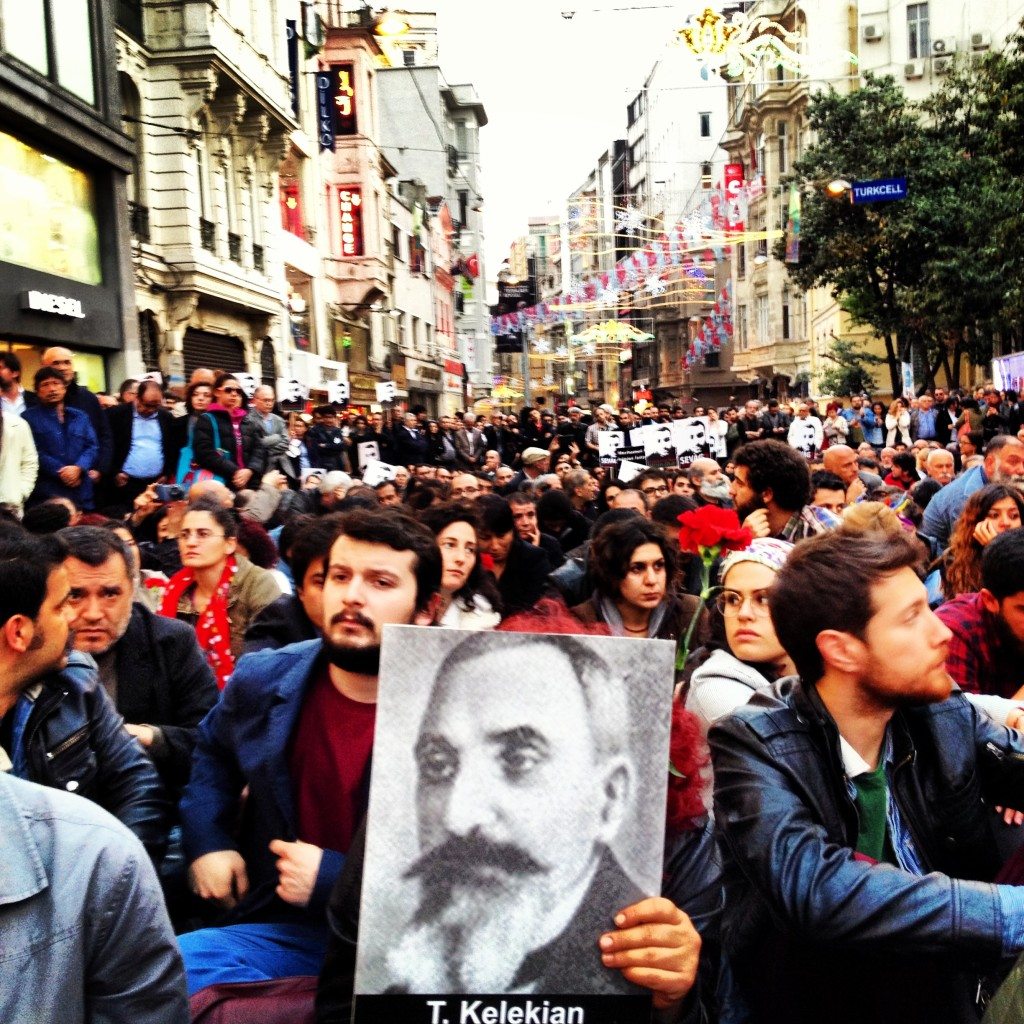click for more
Impressions from the Armenian Genocide commemoration in Istanbul
Ninety-nine years ago in the wee spring hours, Ottoman-era policemen
marched through the streets of old Constantinople. Over the course of
that fateful night, and the weeks that followed, they arrested and
deported the most prominent Armenian writers, poets, journalists,
intellectuals and men who lived by the pen from the Golden age of the
Armenian intelligentsia in old Constantinople. These men were taken to
the Haydarpasha train station and shipped deep into the interior of
Ottoman Turkey where they were jailed and murdered.
Only a few survived, among them the iconic Komitas Vartabed, the
priest, composer and musicologist who became mute and descended into
madness as a result of the horrors he witnessed during the Armenian
Genocide.
Komitas’s ancient musical soul went silent and today, 99 years later,
I sat on the wet asphalt in the heart of Istanbul listening to his
otherworldly voice recorded once upon a time in the early 20th century.
It was crackling and booming on multiple loudspeakers among Armenians,
Turks and Kurds gathered and jam-packed like sardines to honor the
Armenian martyrs and to call what happened here in this country by its
rightful name—Genocide. Young, old, middle-aged, natives and
diasporans…we all sat side-by-side humming with Komitas, Dle Yaman and Der Voghormya.
Youth and elders held up laminated color and black-and-white
photocopies of Krikor Zohrab, Siamanto, Diran Kelekian, Daniel Varoujan
and several Ottoman-era Armenians who lived by the pen and were cut down
by the swords. Their eyes gazed out from the photocopies at this new,
small and fearless generation of Turks and Armenians committed to
keeping the flame and voice of memory alive through the act of solemnity
and presence together as a unified voice.
This is a brave and vocal minority that has chosen to not be silent.
Middle-aged women wept openly. Members of the New Zartonk stood
steadfast with printed banners. All gathered had managed through
solidarity and sheer will to silence the filet mignon of Bolis real
estate where millions pass through on a daily basis.
The press swarmed all over the street, perched on the roofs of
businesses and establishments that demonstrated great respect to the
commemorators by allowing the photojournalists to lean out of their
windows and second-story patios immortalizing this brief hour on this
very busy Spring day where the spirits of our one and a half-million
dead were prayed for. Next year, this generation will return again and
again and again.
While the speechwriters and politicos continue to conjure new ways to
manipulate verbs and adjectives to avoid the truth of the Genocide,
this new generation will be burning the midnight oil printing out the
laminated images of the martyrs.
This small victory is a symbolic one that would have been
unimaginable before. However small, its echoes are being heard now very
loud and clearly across the world thanks to the point, shoot, save and
upload settings in our garden variety of smart phones. And today’s
presence and solidarity, like Komitas’s voice, will not be silenced.
Today, I began to grasp the meaning of the word “vicdan” which means
“conscience” in Turkish.
These young university students and Istanbul natives were here out of
duty and a calling sitting on the damp asphalt holding vigil. They were
here because they cared. Who would have thought that in 2014 we would
hear the ear-shattering boom of Der Voghormya in the
ground-zero of Istanbul? That is not to say things here are where they
should be. Far from it but each small symbolic step here is a step
forward.
After the end of the commemoration, I was handed a red carnation.
With Komitas’s voice lingering in my ears, I felt a certain temporary
peace gnawed by the begrudging reminder that we would never be able to
grasp the complete magnitude of what happened during the Genocide. Yet,
we will continue to hold candles to collective and personal memory and
through voice, song, image, solidarity and creative outpouring honor and
demand justice for what will continue to dwarf our imaginations for
generations to come
Tuesday, April 29, 2014
Subscribe to:
Post Comments (Atom)


No comments:
Post a Comment